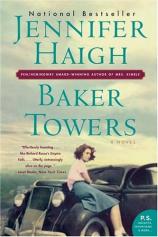Excerpt
Excerpt
Baker Towers

Chapter One
Softly the snow falls. In the blue morning light a train winds through the hills. The engine pulls a passenger car, brightly lit. Then a dozen blind coal cars, rumbling dark.
Six mornings a week the train runs westward from Altoona to Pittsburgh, a distance of a hundred miles. The route is indirect, tortuous; the earth is buckled, swollen with what lies beneath. Here and there, the lights of a town: rows of company houses, narrow and square; a main street of commercial buildings, quickly and cheaply built. Brakes screech; the train huffs to a stop. Cars are added. In the passenger compartment, a soldier on furlough clasps his duffel bag, shivers and waits. The whistle blows.Wheezing, the engine leaves the station, slowed by the extra tons of coal.
The train crosses an iron bridge, the black water of the Susquehanna. Lights cluster in the next valley. The town, Bakerton, is already awake. Coal cars thunder down the mountain. The valley is filled with sound. The valley is deep and sharply featured. Church steeples and mine tipples grow inside it like crystals. At bottom is the town's most famous landmark, known locally as the Towers, two looming piles of mine waste. They are forty feet high and growing, graceful slopes of loose coal and sulfurous dirt. The Towers give off an odor like struck matches. On windy days they glow soft orange, like the embers of a campfire. Scrap coal, spontaneously combusting; a million bits of coal bursting into flame.
Bakerton is Saxon County's boomtown. Like the Towers, it is alive with coal. A life that started in the 1880s, when two English brothers, Chester and Elias Baker, broke ground on Baker One. Attracted by handbills, immigrants came: English and Irish, then Italians and Hungarians; then Poles and Slovaks and Ukrainians and Croats, the "Slavish," as they were collectively known.With each new wave the town shifted to make room. Another church was constructed. A new cluster of company houses appeared at the edge of town.The work -- mine work -- was backbreaking, dangerous and bleak; but at Baker Brothers the union was tolerated. By the standards of the time the pay was generous, the housing affordable and clean.
The mines were not named for Bakerton; Bakerton was named for the mines. This is an important distinction. It explains the order of things.
Chester Baker was the town's first mayor. During his term Bakerton acquired the first streetcar line in the county, the first public water supply. Its electric street lamps were purchased from Baker's own pocket. Figure the cost of maintaining them for fifty years, he wrote to the town bosses, and I will pay you the sum in advance. After twenty years Baker ceded his office, but the bosses continued to meet at his house, a rambling yellow-brick mansion on Indian Hill. A hospital was built, the construction crew paid from a fund Baker had established. He wouldn't let the building be named for him. At his direction, it was called Miners' Hospital.
The hospital was constructed in brick; so were the stores, the dress fac-tory, the churches, the grammar school. After the Commercial Hotel burned to the ground in 1909, an ordinance was passed, urging merchants to "make every effort to fabricate their establishments of brick."To a traveler arriving on the morning train -- by now an expert on Pennsylvania coal towns -- the hat shop and dry-goods store, the pharmacy and mercantile, seem built to last. Their brick facades suggest order, prosperity, permanence.
On the seventeenth of January 1944, a motorcar idled at the railroad crossing, waiting for the train to pass. In the passenger seat was an elderly undertaker of Sicilian descent, named Antonio Bernardi. At the wheel was his great-nephew Gennaro, a handsome, curly-haired youth known in the pool halls as Jerry. Between them sat a blond-haired boy of eight. The car, a black Packard, had been waxed that morning. The old man peered anxiously through the windshield, at the snowflakes melting on the hood.
"These Slavish," he said, as if only a Pole would drop dead in the middle of winter and expect to be buried in a snowstorm.
The train passed, whistle blowing. The Packard crossed the tracks and climbed a steep road lined with company houses, a part of town known as Polish Hill. The road was loose and rocky; the coarse stones, called red dog, came from bony piles on the outskirts of town. Black smoke rose from the chimneys; in the backyards were outhouses, coal heaps, clotheslines stretched between posts. Here and there, miners' overalls hung out to dry, frozen stiff in the January wind.
"These Slavish," Bernardi said again. "They live like animali." At one time, his own brothers had lived in company houses, but the family had improved itself. His nephews owned property, houses filled with modern comforts: telephones and flush toilets, gas stoves and carpeted floors.
"Papa," said Jerry, glancing at the boy; but the child seemed not to hear. He stared out the window wide-eyed, having never ridden in a car before. His name was Sandy Novak; he'd come knocking at Bernardi's back door an hour before -- breathless, his nose dripping.His mother had sent him running all the way from Polish Hill, to tell Bernardi to come and get his father.
The car climbed the slope, engine racing. Briefly the tires slid on the ice. At the top of the hill Jerry braked.
"Well?" said the old man to the boy. "Where do you live?"
"Back there," said Sandy Novak. "We passed it."
Bernardi exhaled loudly. "Cristo. Now we got to turn around."
Jerry turned the car in the middle of the road.
"Pay attention this time," Bernardi told the boy. "We don't got all day." In fact he'd buried nobody that week, but he believed in staying available ...
Baker Towers
- Genres: Fiction
- paperback: 368 pages
- Publisher: Harper Perennial
- ISBN-10: 0060509422
- ISBN-13: 9780060509422




